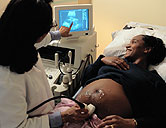
WEDNESDAY, Sept. 26 (HealthDay News) — New research suggests it might someday be possible to create a vaccine that could protect a growing fetus from premature birth and related complications.
The problem: Because fetal tissue contains material inherited from both the mother and the father, it raises the risk that the mother’s immune system may sometimes recognize the fetus as a foreign invader that must be rejected. The result: premature birth, the study authors contend.
In most cases, however, this doesn’t happen and the baby is safely carried to term. But why?
A team of researchers from the University of Minnesota and Cincinnati Children’s Hospital Medical Center believe they’ve found the key: CD4 T cells.
The study authors explained that when a woman becomes pregnant her immune system stimulates a certain type of regulatory cell — CD4 T cells. These cells then throw up a rejection roadblock, stopping the mother’s immune system from attacking fetal tissue and paving the way for a successful pregnancy.
The researchers now believe they have a blueprint that might lead to a vaccine that could better ensure that mothers can carry their baby to term.
“Current vaccines exclusively target immune-activating T cells,” Dr. Sing Sing Way, study senior author and a physician researcher in infectious diseases at Cincinnati Children’s Hospital Medical Center, explained in a news release from the hospital. “With the polio vaccine, for example, vaccination is designed to induce long-lasting immune-activating cells that eradicate the virus with later infection.”
By contrast, Way said, a pregnancy vaccine would aim to stimulate immune-suppressing T cells to prevent the rejection of a fetus.
Way and colleagues detailed their theory in a letter published online Sept. 26 in the journal Nature.
So far, the investigators’ research on a possible vaccine has been limited to work involving mice.
And though research with animals often fails to produce similar results in humans, the study authors said their efforts have yielded some potentially useful information. These insights include the finding that CD4 T cells have a so-called “memory feature” that means, once induced into action during a woman’s first pregnancy, these cells tend to perform their immune system-suppression task even better during subsequent pregnancies. This would explain why the risk for complications and premature birth goes down after a first pregnancy, the researchers said.
But will these observations lead to a vaccine anytime soon?
“It’s a leap at this point to start talking about a vaccine,” said Dr. Deborah Campbell, director of the division of neonatology at Montefiore Medical Center in New York City.
“What this study does is further define how a very interesting and complex biologic process actually happens, in which the mother’s body does recognize that the fetus is foreign but instead of treating it as something to be discarded, tolerates it so that the pregnancy is sustained,” said Campbell, who was not involved with the study.
“It’s certainly elegant science,” Campbell added. “But it is just one small piece in furthering our understanding of the regulation of immune function during pregnancy. And a lot more work needs to be done before one could really look toward developing any kind of a vaccine.”
The research was supported by grants from the U.S. National Institutes of Health.
More information
To learn more about premature birth, visit the March of Dimes.

